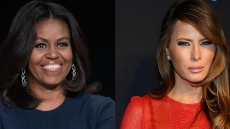TORONTO — In the not-too-distant future, your bank will be able to prevent fraud by learning how you type, your car will unlock when it senses the electrical activity of your heart and the security system at your office will recognize your facial features.
That's according to experts in the field of biometrics, which identifies a person by measuring unique characteristics such as their fingerprints, their retinas or their voice.
But these types of distinctive identification authentication processes offer more than the promise of a higher degree of security than traditional passwords.
Biometrics will also free consumers from the need to memorize a myriad of characters — a convenience that will appeal to anyone who needs to access a secure computer or network regularly.
"People are having to jump through more and more hoops to create a secure authentication," says Karl Martin, founder of Nymi, a Toronto-based startup that created a wristband that can identify its wearer based on their electrocardiogram, or the electrical activity of their heart.
"How many times a day do you have to prove who you are, whether it be through a password or a biometric or other means?"
Banks — and the financial services industry, more broadly — have been one of the quickest adopters of biometrics technology, given their strong need for security and identity verification, says Bianca Lopes, director of strategy at BioConnect.
"They're inherently wired and regulated to protect the customer with things like know-your-client and anti-money laundering rules," says Lopes, whose company helps businesses integrate biometrics technologies across various channels.
Royal Bank (TSX:RY) is currently testing out technologies such as iris scanning, face recognition, speech recognition and fingerprint scans — and is expecting to roll out the features to customers in 2017.
Martin says Nymi has completed successful pilot projects alongside RBC and TD Bank (TSX:TD) to test out how its wristband can be used to verify purchases, while MasterCard recently launched a service that allows users to verify their identities with their smartphones by taking a selfie or using a fingerprint scanner.

Notably, it's the popularity of the fingerprint scanner on Apple iPhones that's made consumers more comfortable and familiar with biometrics, says Dennis Gamiello, vice-president of identity solutions at MasterCard.
"Fortunately, Apple and some of the other digital players that have introduced (biometric) capabilities are in some ways helping train the consumers for us."
Biometrics can also identify users based on how they behave — for instance, their typing patterns or the way that they swipe across the screen on a mobile device.
"The way that you actually interact with the phone, the way that you swipe the phone ... it's fairly unique to you," explains Eddy Ortiz, RBC's vice-president of innovation and solution acceleration.
In the future, behavioural biometrics could even be used to detect if a fraudster has somehow gained access to your bank account, Lopes adds.
While identity verification is important, the capabilities of biometrics go beyond that function, notes Martin. The technology can also be used to create personalized environments — by setting the thermostat to your preferred temperature, for example — at your home, the office or a commercial space.
"We're looking at how can identity be used to create completely personalized experiences," says Martin, pointing to cars as an example.
"You may have a shared vehicle but you have preferences in terms of the seat height and position and the steering wheel and entertainment and all of those things."
Experts concede that while biometrics can beef up security, improve convenience and create personalized environments, for some users the technologies may evoke scenes from the popular science fiction film "Minority Report" — a Tom Cruise mystery-thriller, which features a future of nearly boundless technological advancements designed to protect its citizenry.

"There will be consumers who get creeped out," says Krista Jones, head of work and learning at the MaRS Discovery District.
Ultimately, though, the technology gives consumers a greater guarantee that their private information will be kept safe, she adds.
"We have an opportunity to craft this in such a way that the privacy of the consumer is at the heart of this."




